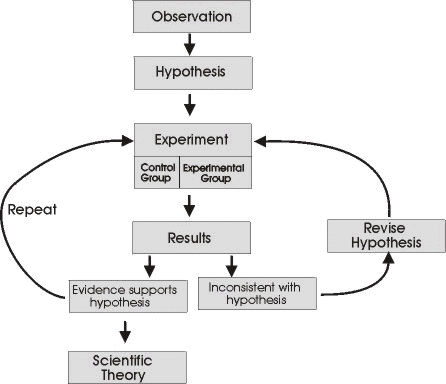Having earlier discussed what a scientific theory/fact is or isn't in this thread:
http://www.hitechcreations.com/forums/showthread.php?threadid=71568 we can now move on to discussing the scientifc process itself. It'll further help to illustrate just why a scientific theory cannot be compared to a JFK assassination theory or faith in religious deities.
The following figure illustrates the flow of events in the methodology of science:

I'll make use of an example, that things tend to fall, to illustrate and clarify. It's just meant to illustrate so don't blast minor inconsistencies, they're not the heart of this post.
First, there is an observation. "Things fall down when dropped" or alternatively 'things seem not to be able to support themselves in air if they're heavier than air". It's important that the observation can be said to be true and isn't too much in doubt. "Things fall away from the centre of the planet Tellus if dropped on the surface of said planet" would not be adequate for instance. Generally it's just an observation of a fact.
From this, a hypothesis is formed. This is what most people think of as a 'theory'. A hypothesis is simply a possible explanation to an observation. It is of itself NOT evidence, nor is it circular in nature - that is, the hypothesis does not try to prove itself. It's just a possible explanation. In our example, we'll have two: the first is that there is a force that acts upon all things called gravity. The second is that the weight of all the gasses in the atmosphere pushes things down.
Now that we've formed our hypothesis(es), we're gonna test them. We're gonna see if they match up with reality.
This is done by using socalled controlled experiments. Such an experiment is one in which all treatments (that is, that which is investigated) are identical except that some are exposed to the hypothetical cause and some are not. Any differences in the way the treatments behave is then directly related to the presence or absence of the cause. The experiments are to be repeatable so other scientists can validate them and find eventual flaws.
In my example, we can test if air is causing things to fall by letting a rock fall in a container full of air and in a vacuum. To test gravity we can use centrifugal force to see if we can get a rock to 'fall upwards'.
If the results are consistent with the hypothesis, the result can be said to be
evidence in support of the hypothesis. When enough evidence
accumulate, the hypothesis is said to be a scientific
theory. In the case with gravity, it's consistent with the hypothesis - a force causes things to be 'fall'.
If the results are inconsistent with the hypothesis, you revise your hypothesis and do more controlled experiments. This way, one can accumulate evidence that suggest that the hypothesis is NOT consistent with reality.
Therein lies the beauty of science - don't like a theory? Form a hypothesis, do experiments, gather evidence and have it removed/corrected! Science is its own friend in this way - self correcting. Nothing is set in stone (although many scientists are quite unwilling to let go of their pet theories) and ANY theory can, given enough evidence, be declared true or false, or alternatively go from theory to 'merely' a well supported hypothesis.
Why JFK assassination theories ain't scientificIt is true - they start with an observation. JFK was killed by a number of bullets. Also, there's a hypothesis, ranging from one shooter to aliens secretly kidnapping him and faking his death. But there are no controlled experiments (am talking conspiracies here). A person sauying "I think it's likely that there were two shooters because, like, one dude couldn't have done it" is offering his hypothesis and evidence in the same sentence without giving more evidence. There aren't any experiments and thus no results to match against a hypothesis.
Why Creationism isn't scienceWill cover this in another thread so as to not dilute this one.
Hope I haven't been too 'low level' or anything or come across as looking down my nose - I just want it laid out plainly so we can agree and with it form the basis for discussions regarding scientific theories - including evolution and alternatives to it.
This is by no means near a description of the whole methodology itself - rather just outlying the basics, which is enough for most discussions (some discussions require detailed criticism of the scientific methodology, but it's usually discussions on levels way above my own).
Any disagreements?